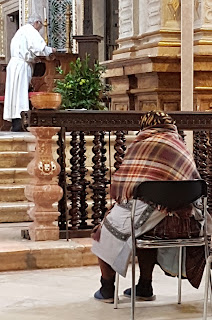I am penning this post in response to a short opinion piece on the Guardian website by Hugo Drochon, a Cambridge academic, entitled ‘The anti-democratic thinker inspiring America's Conservative elites’, and with the sub-heading ‘In his new book, the Catholic writer Patrick Deneen launches an attack on pluralism – and the Conservative establishment is cheering’. I consider that this article propounds some very important and common misunderstandings about Catholicism; I have not however read the book it reviews, so I have no idea whether these misunderstandings stem primarily from the original author (Patrick Deneen) or the reviewer (Hugo Drochon). Indeed I allow that they reflect misunderstandings on both the liberal and the traditionalist sides of such arguments.
Firstly, let us cut to the core of Drochon’s case, the two reasons that he gives for dubbing Deneen anti-democratic. ‘First, Deneen believes political decisions should not emanate from within the community itself – the democratic ideal of self-government – but from an outside source, namely God (and a Catholic God at that).’ There are a couple of obvious objections to this statement, such as the lack of real life examples where this democratic ideal is actually realised anywhere except in the imagination of what one might call the Liberal Cosmopolitan Church, and hence the question of what that most heinous of mortal sins that we hear so much about actually means,- being undemocratic. Are we seriously expected to believe that the mere act of voting now and again indicates ‘decisions emanating from within the community’?
However, I will allow that the latter do indeed represent a noble ideal, however other-worldly it may sound. Here I come to a much more radical critique of Drochon’s thought; he has evidently failed to study either the New Testament or Catholic theology. Christ said indeed that ‘No man can come to the Father except through me.’ But where do we encounter Christ? In our brothers and sisters, in our neighbours and in strangers who need our help, especially the poor, beaten up and outcast ones. God is by no means merely an ‘outside source’; though He does indeed transcend this world, He is only accessible to us through it, through our brothers and sisters, at the very heart of the human community, wherever people actually manage to love and care for one another; indeed He is the heart and soul of life itself.
It is the failure to understand the above which leads to Drochon’s second objection:- ‘Deneen believes the Catholic community has a privileged access to the truth that the rest of the political community – which has already made up its mind on gay marriage and premarital sex – does not. From this perspective, the national community is wrong, and democracy is mistaken.’
This is broadly true, but are we to believe then that the great Liberal Church, with its priesthood of media pundits and academics and their ‘democracy’, is infallible, rather than the Catholic Church? And after all, not just the Catholic Church, but in the case of homosexual marriage, just about the entirety of humanity’s religious traditions, and previous generations to the year dot, along with any previously known humanistic understanding of marriage, seem to me more credible than any bunch of contemporary politicians. Are we to believe that democratic majorities are not subject to manipulation and mistakes, that their decisions are not to be subject to any objective critique, and that notions of any natural law are merely Catholic hocus-pocus? Evidently Mr Drochon has forgotten that, for example, Herr Hitler established his power on the back of democratic votes and referenda; and on what basis did the small minority who continued to oppose him within Germany take their stand? Again, does he consider that those of a European bent within Britain today should just shut up and abide by the majority democratic decision on Brexit?
The attempt to write such concerns off as merely those of the Conservative Establishment, and to pretend that it is only the Left that is interested in building bridges, is grossly misguided. It is a commonplace to say that you can only build bridges from firm ground. The political ideologies of right and left both are much more inclined in practice to consider that they have a monopoly of truth than practising Catholics who, believing they have indeed a good handle on truth, and that truth is ultimately indivisible, are prepared to look for truth everywhere and to respect it when they find it, be it in a Muslim, a Hindu or even a Liberal!
Which brings us to a place where we might look to build the odd bridge. Ideals of democracy after all were transmitted from the brief experiments in the Ancient world to our own by way of those very monastic communities that our columnist decries, but which were enduring democratic institutions in their own right.
Surely you do not have to be a member of the ‘American conservative establishment’ to believe that there is a very grave crisis going on for the credibility of democratic institutions everywhere, and that one way to address it is by reinvigorating democracy at the community level, and building on that to ensure that the macro institutions are much more rooted in and answerable to these communities? Perhaps our friend would consider taking a look at the teachings of the Second Vatican Council and at Catholic social doctrines, notably concerning solidarity and subsidiarity, before he goes preaching at us again?





















